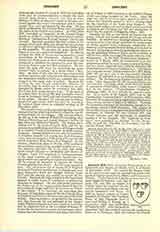

Innocent XII, POPE (ANTONIO PIGNAPELLI), b. at Spinazzolo near Naples, March 13, 1615; d. at Rome, September 27, 1700. He entered the Roman Curia at the age of twenty and was successively made vice-legate at Urbino, inquisitor in Malta, and Governor of Perugia. Under Innocent X he became nuncio in Tuscany, and Alexander VII sent him as nuncio to Poland, where he regulated the disturbed ecclesiastical affairs and united the Armenians with Rome. In 1668 he became nuncio at Vienna. Innocent XI created him Cardinal–Priest of San Pancrazio fuori le mura and Bishop of Faenza on September 1, 1682, then Archbishop of Naples in 1687. After the death of Alexander VIII the cardinals entered the conclave at Rome on February 11, 1691, but neither the French nor the Spanish-Hapsburg faction among the cardinals could carry its candidate. A compromise resulted in the election of Cardinal Pignatelli on July 12, 1691. In his Bull “Romanum decet Pontificem” (June 22, 1692), which was subscribed and sworn to by the cardinals, he decreed that in the future no pope should be permitted to bestow the cardinalate on more than one of his kinsmen. Towards the poor, whom he called his nephews, he was extremely charitable; he turned part of the Lateran into a hospital for the needy, erected numerous charitable and educational institutions, and completed the large court-house “Curia Innocenziana”, which now serves as the Italian House of Commons (Camera dei Deputati). In 1693 he induced King Louis XIV of France to repeal the “Declaration of the French Clergy”, which had been adopted in 1682. The bishops who had taken part in the “Declaration” sent a written recantation to Rome, whereupon the pope sent his Bull of confirmation to those bishops from whom it had been withheld. In 1696 he repeated his predecessor’s condemnation of Jansenism and in his Brief “Cum alias” (March 12, 1699) he condemned twenty-three semi-Quietistic propositions contained in Fenelon’s “Maximes”. Towards the end of his pontificate his relations with Emperor Leopold I became somewhat strained, owing especially to Count Martinitz, the imperial ambassador at Rome, who still insisted on the “right of asylum”, which had been abolished by Innocent XI. It was greatly due to the arrogance of Martinitz that Innocent XII advised King Charles II of Spain to make a Frenchman, the Duke of Anjou, his testamentary successor, an act which led to the “War of the Spanish Succession”.
MICHAEL OTT

